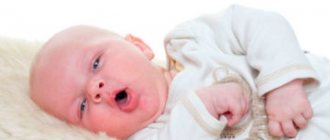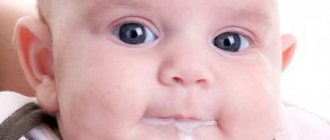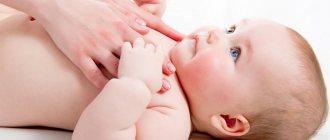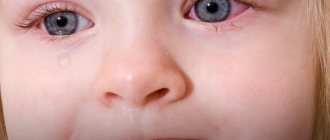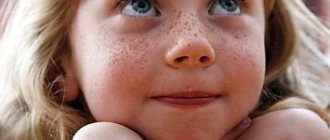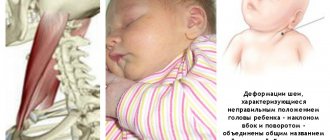Every mother measures the child’s temperature only when the baby shows signs of illness. If the baby is active, cheerful and cheerful, then there is no need to take temperature measurements at all. To make sure that the baby has signs of illness, the mother just needs to put her hand or lips on the baby’s forehead to determine the elevated temperature.
If the baby's forehead is cold, then there is no need to take temperature measurements. But there are cases when a child’s forehead is cold, and the temperature rises to 38 degrees. What does this indicator indicate? Thermometer malfunction or the development of an unknown disease? We will look at this in more detail in the material.
The child has a fever and a cold forehead
Parents resort to measuring the child’s body temperature when there are accompanying signs for this. These signs include: lethargy, general malaise, loss of strength. If you touch not only the forehead, but also the back of the head, it will not be so cold, and a repeated measurement shows 38 degrees. If the baby has a fever, but the forehead is cold, then the main sign of this phenomenon is an infectious or viral infection of the body.
It is important to know! If the thermometer mark does not exceed 38 degrees, then giving antipyretics is strictly contraindicated.
If parents detect signs of illness in their baby, then there is no need to hesitate and wait until serious complications begin. You should immediately visit a doctor or call an ambulance. We will find out further what reasons can provoke high fever, while the child’s forehead remains cold.
Symptoms of white fever
One of the fundamental causes of such a phenomenon as a cold forehead and fever is white fever. White fever received this name for one simple reason: as the disease develops, signs of pale skin appear. If the forehead is cold and the baby’s temperature rises, this indicates that a spasm of blood vessels is developing. With vascular spasm, not only the forehead gets cold, but also the limbs.
It is important to know! The cause of white fever is pathogenic bacteria that infect the child’s body.
Spasm of blood vessels is a process in which oxygen begins to be localized in all vital organs. In this case, there is a strong outflow of blood from the extremities, as a result of which when you put your hand to your forehead, you can find that it is not hot. Vasospasm is a very dangerous sign, often manifesting itself in children at high temperatures above 38 degrees. Some children who have pathologies with the cardiovascular system are prone to developing white fever if the temperature is above 37 degrees.
It is important to know! A temperature of 37 degrees does not pose a danger to a child only if the baby has no signs of white fever.
In addition to the fact that the baby's head and limbs are cold, additional signs of white fever include: weakness, exhaustion, dizziness, lethargy, loss of appetite and pale skin. There are cases when the child begins to delirium and has hallucinations. In this condition, the baby should not be disturbed, but should immediately call an ambulance, informing the dispatcher that the baby has signs of white fever.
Cold forehead due to overheating
Why do children's body temperature rise, but their forehead becomes cold? If this phenomenon was not provoked by white fever, then the cause may be a banal overheating of the body. Many parents miss one very important point when wrapping up their children during cool weather. A child sweats very quickly during active games, so if you wrap your baby up, this will negatively affect his well-being as a result of overheating.
The main symptoms of overheating of the body are the following factors:
- Nausea and headache.
- Fever.
- Bleeding from the nose.
- Difficulty and rapid breathing.
- Temperature increase.
- Fainting.
If the cause of the baby’s illness is overheating of the body, then you should resort to the following actions:
- undress the child to allow normal temperature to settle;
- prevent sun exposure to the baby’s body;
- Have your child drink as much fluid as possible to prevent dehydration.
It is important to know! Giving lotions to a child with a fever is extremely contraindicated, so if the child does not get better, you should give him an antipyretic and then call an ambulance.
Very often, after the birth of a newborn child in the house, his parents have to face various difficulties regarding his upbringing. A symptom such as a cold forehead is a normal phenomenon that many parents have to deal with. If you are concerned about this phenomenon, you need to palpate the rest of the baby’s limbs to make sure that the process of thermoregulation is not disrupted.
Very often, when parents come to see a pediatrician, they start asking the doctor ridiculous questions that evoke different feelings in him.
Parental tactics for excessive head sweating in infants
In this case, the main methods of combating head sweating in infants are a comfortable temperature regime and microclimate in the room - frequent ventilation of the room with regular wet cleaning.
It is necessary to take a closer look at the bed linen in the crib and replace it with linen made from natural fabrics - cotton, linen, without artificial threads. You also need to choose the right clothes for your baby so that excess sweat is absorbed and does not remain on the baby’s scalp, creating and aggravating the “greenhouse effect.”
The baby's head is sweating a lot
Severe sweating of the head of an infant can develop in the presence of somatic pathology - colds or viral diseases (in the incubation or initial prodromal period, even in the absence of the first clinical symptoms of the disease - runny nose, cough, fever). In this case, sweating of the head may be accompanied by lethargy, refusal to eat, anxiety, and regurgitation.
Also, these symptoms can manifest themselves with the progression of intrauterine infections (chlamydia, toxoplasmosis, cytomegalovirus infection).
In case of blood diseases of various etiologies (anemia), endocrinopathies, liver and kidney diseases, the first signs may also be lethargy, increased sweating of the scalp, and anxiety.
Therefore, if any negative symptoms or changes in the behavior of young children appear, you should seek advice from your local doctor.
Causes
Very often, a child’s cold forehead is observed during periods when he is freezing. In order to verify this, you need to palpate the rest of his limbs. If they are also cold, then you should calm yourself down and dress your child warmer so that he warms up faster. Most often, this phenomenon is observed in infants who lie in one position for a long time. In order to avoid overheating of the head, you need to leave the child in one position for as little time as possible.
, even if we are talking about newborn babies, they need to be constantly shifted, picked up, and walked with them.
A very common phenomenon is when a newborn baby has a cold forehead, but a hot head is also a normal phenomenon that should not frighten parents. This only happens because the sweat glands are well developed, and the little person’s scalp cools down quickly.
There are also cases when a child is sick, his forehead is cold. Therefore, if you see signs of illness in your child, you do not need to rely on yourself and touch only his forehead - it is better to take a thermometer and measure the child’s temperature in order not to miss the development of the baby’s disease. This is a completely normal phenomenon that parents of newborns have to deal with.
First teeth
At the time when a child's first teeth erupt, his body begins to respond to pain in the oral cavity by secreting sweat. This is considered normal.
But at the same time, it is during this period that the child’s body becomes vulnerable to various infectious diseases and requires special care. It is necessary to reduce cold sweating in every possible way and monitor symptoms.
Frequent baths with medicinal herbs will help with this. Normalizing the temperature in the room and frequent walks in the fresh air will also have a positive effect on the growth and development of the child without risk.
Diseases
But if, then this may be a sign that manifests itself in different symptoms. But such symptoms should alert parents.
If, but a cold forehead, this may indicate the development of such a serious disease as hypertension syndrome, which is manifested by the following symptoms:
- Frequent.
- Hot neck.
- Enlarged veins on the forehead and temples.
- Violation of muscle tone - this can be determined by a neurologist.
- Tense fontanel. It may pulsate.
- Increase in volume of the skull.
But in some cases, a cold forehead may be a harbinger of some disease and a doctor’s consultation is necessary. The most common diseases that can appear in a newborn baby due to a cold forehead are the following:
- Poisoning.
- ARVI.
Symptoms of hydrocephalus
A hot forehead can cause hydrocephalus, a rare neurological disease with pathological changes in the shape of the cerebellum.
Manifestation of hydrocephalus in infants:
- Hot head with excessive sweating;
- Significant increase in the size of venous vessels;
- Unstable condition of the baby's head, constantly tilting back;
- Frequent regurgitation;
- Vomit;
- The child reaches his hands up, grabs his head, worries, cries;
- Unnaturally tense fontanel;
- Impaired muscle tone throughout the body;
- Difficult cases include an increase in the volume of the skull.
Hydrocephalus is a very serious disease; its neglected condition will lead to mental retardation. Therefore, if you have even minimally similar symptoms, you should consult a neurologist, he will make the correct diagnosis. Timely treatment of hydrocephalus completely cures the disease.
Dr. Komarovsky, a famous Russian and Ukrainian doctor, a good pediatrician, uses his own method of preventing diseases.
Let's look at the most popular advice given by Dr. Komarovsky:
- Bath more often. The baby must be bathed every day, this normalizes blood circulation, strengthens the body, and prevents the occurrence of various diseases;
- The mother can give the baby a daily massage; massage has a positive effect on the mental development, as well as the physical health of the child;
- It is necessary to give plenty of fluids; water normalizes the process of energy exchange and regulates temperature;
- You cannot swaddle your baby tightly;
- Do not wear tight clothes;
- You need to spend a lot of time outdoors.
What to do
First of all, you need to identify the reason for the child’s cold forehead.
. If this happens only because the baby is cold, then you need to warm him up as soon as possible. But you should not put several layers of clothing on your child, otherwise, having gotten rid of one problem, you will have another - overheating of the child, which is also not desirable for the baby.
If we are talking about the development of the disease, then you need to consult a doctor, who will treat the baby. It is worth remembering that you should never self-medicate, since we are talking about a newborn child.
First of all, you need to contact a pediatrician, who will give referrals to other specialists. Most often, he writes out a referral to a neurologist or neuropathologist, who continues to monitor the child’s condition.
If there is the slightest suspicion of rickets, the doctor will prescribe it and also conduct a full examination of the child. But the most important thing is not to exceed the dose prescribed by the doctor, as this can only worsen the child’s condition.
But even if, after a doctor’s examination, the child’s forehead is constantly cold, but no obvious pathologies are found, then there is no need to worry. You need to start monitoring the thermoregulation of your baby’s body and dress him warmer if it’s suddenly cold in the apartment.
As practice shows, most often parents make a big problem out of this and treat the baby for diseases they have invented.
If, in addition to this symptom, the baby does not show any other signs of the disease, then you should calm down. After all, you must admit that if a child feels bad, he will probably tell his parents about it. There should be no cause for concern in the following cases:
- The baby has a good appetite.
- The child is sleeping peacefully.
- The baby is behaving as usual and is not hysterical.
- Leads an active lifestyle.
- He develops correctly, in no way inferior to his peers.
But if the symptoms torment the child along with other manifestations of the disease, it is worth contacting a doctor, who will explain the whole picture.
In order to calm yourself down, you need to take all the tests that the doctor prescribes and only then talk about the health of the child. Often this symptom manifests itself due to fatigue and overwork, and there is nothing to worry about. You just need to give your child time to rest.
In conclusion, we can conclude that a cold forehead in a child can be a phenomenon of some kind of disease, or simply a physiological process. Therefore, if you notice a similar symptom in your child, do not panic.
, you need, on the contrary, to calm down and consult a doctor about the issue that has arisen. You also need to observe your child’s behavior; if it is no different from usual, then there should be no reason to worry.
Ambulance
Sometimes sweating can occur suddenly and in combination with other symptoms. The child should receive immediate help in the following situations:
- Sweat is accompanied by very high or, conversely, low body temperature.
- Dry, persistent cough, severe runny nose.
- Nausea, headache.
- Bad sleep, the bed was all wet.
- A rash appeared on the skin.
- There is severe lacrimation and pus from the eyes.
- Refusal to eat.
If, with a cold, a child breaks out in uneven cold sweat and the body temperature decreases, then the condition may indicate serious problems with the heart and blood vessels. This is also a reason to contact an endocrinologist.
To understand why a child has cold sweats, you need to be examined by an endocrinologist and neurologist. The main indications for contacting these specialists are:
- the appearance of sweat at rest or during sleep;
- in addition to profuse sweating, there is an unpleasant odor, most often of ammonia;
- sticky sweat;
- the baby is excited and capricious even after sleep;
- one area of the body becomes wet;
- trembling of individual parts of the body is observed.
Ambulance is necessary if cold sweat signals serious malfunctions in the functioning of the whole organism. There is no need to waste time if you lose consciousness, body temperature drops below 35 degrees, or a bluish tint appears in the extremities.
opotlivosti.ru
Worth paying attention
If all the factors described above have been eliminated, but the child continues to break into a cold sweat, this may indicate a serious illness and infection. There are a number of diseases that cause sweating. Among them are:
Rickets is a disease in which a disorder of the musculoskeletal system occurs due to a lack of vitamin D. It is quite rare in our regions, since there is no shortage of ultraviolet rays. As a rule, premature babies suffer from it.
Metabolic disease. In addition to sweating, there will be sudden weight loss or gain.
We take the necessary tests
After contacting a specialist, the following tests will be prescribed:
General blood analysis. It's better to make it expanded. Be sure to take it on an empty stomach, only in this case the result obtained will be informative.
If the doctor suspects abnormalities in the nervous system, an ultrasound of the brain and cervical spine will have to be done. The manipulations are completely painless. If the child’s fontanel does not heal, an ultrasound is performed through it.
Test for the presence of a sufficient amount of vitamin D in the blood.
Glucose tolerance test. It shows blood sugar levels and diagnoses hypoglycemia.
Examination of lymph nodes.
If no abnormalities are found in tests and studies, it is possible that this is hereditary in the baby. In this case, the doctor will prescribe a course of vitamins and massage. This will help reduce sweating.
Do not be afraid of specialists; the doctor is interested in understanding the cause and curing the disease. Cold sweat in children is not uncommon. Many parents immediately begin to sound the alarm. And they do it in vain. After all, the reasons may lie in the uncomfortable conditions created for the child (high temperature in the bedroom, hot downy feather bed and much more).
Once again I’m writing about this... it doesn’t give me peace!
We were at the medical center and they said it was normal, but I don’t think it’s normal.
They prescribed us magnesium B6, glycine, picovit and motherwort.
I gave magnesium at night for three days (as prescribed) and tonight my son vomited twice, I think why? from magnesium?
I went to our outpatient clinic and they told me that there was too much peak, and I should drink the rest. I asked for a referral for blood tests, got tested, and got the results on Friday.
who had this? the child is active, cheerful... what's the matter.
I think low hemoglobin
Why is the back of a newborn's head hot?
Baby's hot head
During pregnancy, the baby is in the mother's womb, where the temperature always remains at 38 °C. Immediately after birth, the baby finds himself in an environment to which he is not at all accustomed. The baby's skin is wet at birth, which leads to rapid cooling, so in the first minutes the baby is immediately dried and placed near a heat source.
Everyone knows that a hot head means illness and fever. Often a young mother, discovering that her baby has a hot head, panics and calls a doctor. In most cases, you don’t need to worry, since a baby’s body is structured differently than an adult’s. He has illnesses that are unique to him and his own principles of functioning. His body temperature is not constant, since thermoregulation processes have not yet been formed. The baby must be properly dressed so that he does not experience either cold or heat. Do not wrap your baby up at night as this may cause overheating.
Humans, like mammals, have a constant body temperature that does not depend on the environment. This constancy is the result of complex thermoregulation mechanisms that ensure metabolic processes. They are controlled by the central nervous system and the center of the brain - the hypothalamus. It receives signals from nerve endings and sends them to different systems of our body. Heat exchange is carried out due to heat transfer and heat production.
In infants, heat production occurs due to oxidation processes in brown adipose tissue. It is present only in the fetus and the newborn child. Brown fat is produced from the twenty-sixth week of pregnancy and by the time the baby is born it makes up up to 8% of his body weight. It is located in the neck area, behind the sternum, between the shoulder blades. The peculiarity of this mechanism is that under the influence of the work of cabbage soup
Sweating of the head in an infant with rickets
Today, quite often the cause of increased sweating of the head in young children is the development of rickets. Vitamin D deficiency occurs when there is insufficient intake of it into the baby’s body during pregnancy and its absence in sufficient quantities in the depot. This can occur in premature babies, children of twins, with pathologies of pregnancy (severe toxicosis, severe somatic diseases in the mother, disorders of the fetoplacental circulation). And also in case of impaired absorption of vitamins and microelements in infants (enzymopathies, inflammatory diseases of the gastrointestinal tract, dysbacteriosis), with reduced insolation (winter season). But it is dangerous to use vitamin D preparations on your own - a pediatrician, if necessary, will prescribe a medicine, dose and frequency of administration (daily or every other day) for the prevention or treatment of the initial stages of rickets.

